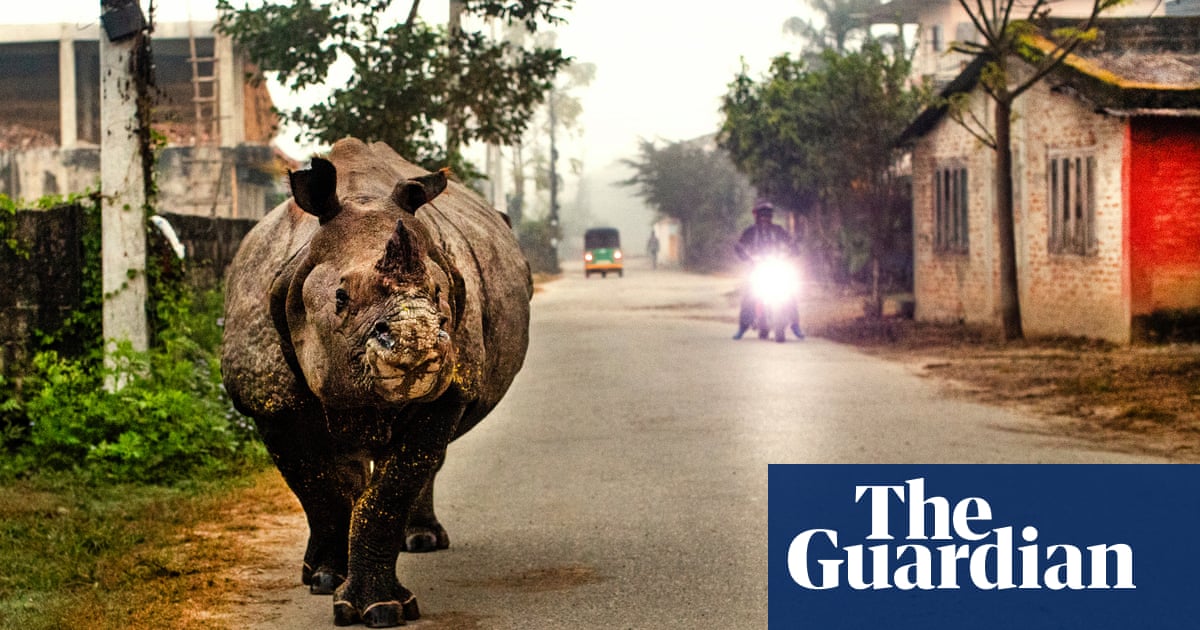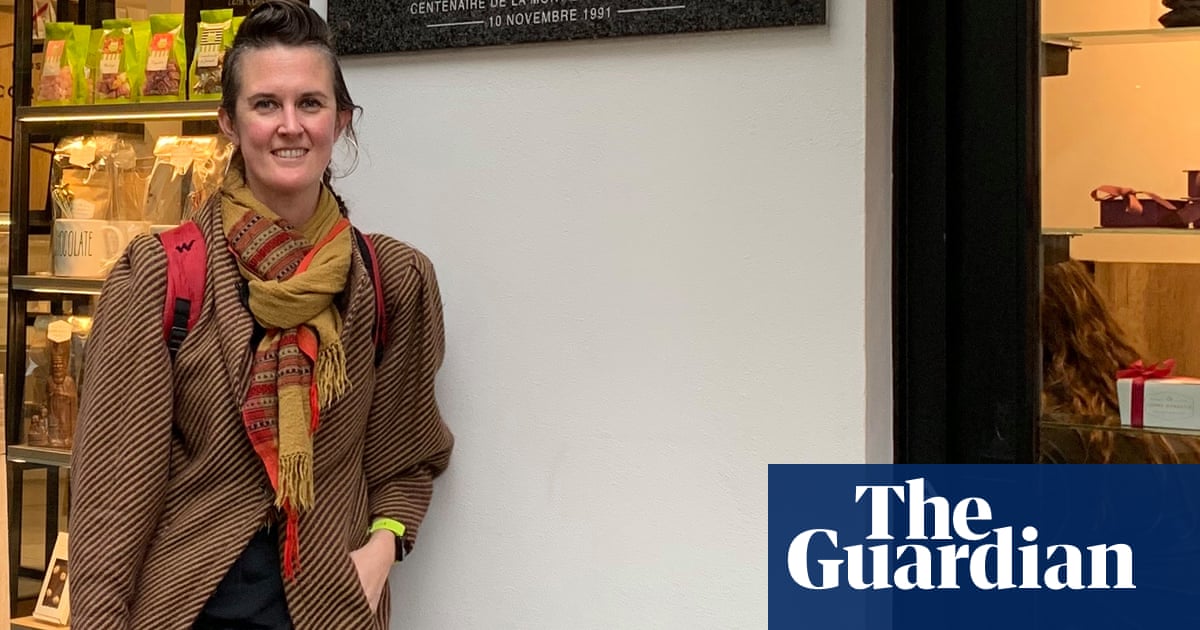Ali Aljamal came to the US from the Gaza Strip in September 2023 as a 15-year-old exchange student through the Yes program, a competitive scholarship run by the state department.
“My goodbye to Gaza was not enough,” said Ali, speaking over the phone from Redding, California. An eager and organized young man – Ali was the youngest in his cohort – he was so keen to have “a breather from the war zone environment in Gaza” that he didn’t say goodbye to the beach or his friends before coming to the US.

A month later, war broke out and he watched Gaza get razed to the ground: “It’s like you and your childhood best friend argued one day before he died.”
The state department did not offer to help the 13 Yes students from Gaza stay in the US after the war began. So Ali decided to seek asylum. Shortly before his 16th birthday, he went to the US Citizenship and Immigration Services (USCIS) office in Sacramento for an appointment. He filled out paperwork that asked for his country of birth: Palestine – Gaza, he wrote; country of citizenship: Palestine. But the clerk handed his paper back and said, in Aljamal’s recounting: “We don’t put Palestine – Gaza. Just put Jordan instead.”
Though credibility is critical for asylum claims, Ali followed the instructions, crossed out Palestine and wrote in a country that he only once briefly passed through on his way to the US.

Ali’s story is emblematic of the Kafkaesque system that Palestinians seeking urgent protection in the US must navigate, if they can even make it out of Gaza. The US does not recognize Palestine and is politically disinclined to recognize persecution by the state of Israel in refugee and asylum claims. And apart from those who have acquired citizenship elsewhere, Palestinians have, since 1948, been simultaneously stateless and largely excluded from the international refugee system.
The US took in more refugees this year than any other year since 1995, but it has hardly resettled anyone from Gaza since the start of the war. And since the US asylum system is so backlogged, it is unlikely that a single request from a Palestinian fleeing Gaza in the past 14 months has been approved. (In the US, refugee status and asylum are two different immigration pathways; refugees generally apply from abroad, asylum seekers from inside the US.)
And the problem is about to get worse. Donald Trump has vowed to bar refugees from Gaza and immediately reinstate and expand his Muslim travel ban. The president-elect plans to carry out mass deportations, and his allies have promised to crush pro-Palestinian protesters. There is a high likelihood that the routes taken by the few Palestinians from Gaza who have made it into the US will be quickly closed off once he enters office.
To qualify for asylum or refugee status, applicants must prove that they face persecution on one of several grounds, such as their religion, political opinion, or nationality. Immigrant rights advocates who spoke to the Guardian argued that Palestinians from Gaza should qualify on several grounds given the scale of the violence this group faces.
Instead, to qualify, they usually must prove persecution by someone other than Israel. Mike Casey, a US diplomat who resigned from the office of Palestinian affairs in Jerusalem this summer, said he helped one Palestinian from Gaza get resettled in the US as a refugee. That was after they were “outed as working for the US government”, putting them at risk of retaliation from Hamas and other Gaza-based militants. But he couldn’t argue their case based on Israel’s bombardment of the coastal territory, including their home while they were inside it.
“If I tried to justify it saying they can’t go back to Gaza because of Israeli threats, it would have never been approved,” said Casey.
A number of immigration attorneys who spoke with the Guardian reiterated this point – that despite its scale, Israeli state violence against Palestinians is rarely considered in refugee or asylum claims.
“Their asylum claims require a higher burden of proof,” said Amira Ahmed, an immigration attorney based in San Francisco who works with Project Immigration Justice for Palestinians (IJP), a collective of hundreds of immigration attorneys volunteering to help families get their loved ones out of Gaza.
Casey is aware of other refugees from Gaza who were approved to come to the US – “there’s more than one, but not many” – but not because of Israeli violence. Rather, to be recognized by the US, Palestinian refugees generally must claim persecution from Palestinian political or militant groups, or from officials in their host countries.
A state department spokesperson told the Guardian that a total of 140 Palestinians had been resettled in the United States in the past five years and only 31 in the year since the conflict in Gaza began. They were by and large brought from Iraq and Turkey, the spokesperson said, with smaller numbers from Lebanon, Egypt and Jordan, including some LGBTQ+ individuals.
The spokesperson declined to clarify whether any of the 31 refugees had fled Gaza after 7 October 2023.
News reports from April said the Biden administration was considering admitting some refugees from Gaza, if they had relatives who were American citizens or permanent residents, but the pilot program has remained shrouded in secrecy, and it is not clear whether anyone has come in as a result.
“Palestinians inside the United States are allowed to file an asylum application,” a USCIS spokesperson said in response to questions from the Guardian about Aljamal’s experience applying for asylum.
“Asylum applicants are required to submit a written statement that relates to the claim of asylum, and applicants can provide additional clarification about country of citizenship in that section.”
The Palestine exception
Despite their making up one of the largest groups of refugees in the world, Palestinians’ state of limbo since 1948 has created bureaucratic barriers unique to them.
All refugees who are resettled in the US from Palestine have their “country of origin” categorized in USCIS data as “Unknown”. A footnote explains this “Includes admissions from the Palestinian Territories”.
A 2018 USCIS memo obtained through a Freedom Of Information Act request confirms that the US only allows immigrant applicants to name Palestine as their country of birth and citizenship if they were born before 1948. Others born in Israel and the occupied territories are variously assigned Egypt, Jordan, Israel or Syria as their country of birth. (For example, Palestinians born in Gaza are considered in the US immigration system to have been born in Egypt; those born in the West Bank are coded as coming from Jordan.)

“The US immigration system is systemic and intentional in its exclusion of Palestinians,” said Ban Al-Wardi, a Los Angeles-based immigration attorney and coordinator of Project IJP.
Palestinians are the only refugee group to have their own dedicated UN agency. The United Nations Relief and Works Agency for Palestine Refugees (Unrwa), which provides education, healthcare, food and other services, was set up in 1949 as a way to help displaced Palestinians after their eviction from what is now Israel. It was meant to be a temporary solution for what was meant to be a temporary status.
But while Unrwa – which the Israeli parliament recently voted to ban – is a lifeline for Palestinian refugees, it lacks the authority to resettle them. Only the UNHCR, the agency for all other refugees, can do that. As a result, they are largely excluded from the international refugee system established after the second world war.
“Palestinians, I would argue, have never had the right to return to their homes and live in dignity, but they’ve also never had the right to go onward and seek asylum,” said Maria Kari, a Houston-based human rights attorney and co-founder of the Gaza Family Project, which provides legal aid to Americans trying to rescue their family members in Gaza.
Nightmare at the border
Before the Khateibeltamimi family fled Gaza on 5 November 23, after enduring a month of war, Mona Khateibeltamimi, 38, would write her daughters’ names on their wrists so they could be identified in the event of an airstrike.
The US government assisted them in escaping from Gaza to Cairo and gave their daughter Tala, 13, a US tourist visa. Their younger daughter, Salwa, 10, is a US citizen and the parents had valid visas as they had just visited family in the US that summer. Khateibeltamimi’s husband, Mutaz, holds Jordanian citizenship, while Mona and Tala hold Palestinian identity documents but are stateless.
Upon their arrival at Dallas airport on 29 November last year, a new “nightmare” began, Mona told the Guardian over the phone from Cairo – one representing of the structural barriers facing Palestinians seeking refuge.

When they landed, Mona said, the family was sent for secondary screening at the airport. Mona and the kids were separated from her husband and both parents were interrogated for over 24 hours.
The family had planned to stay in the US for a month or two, hoping to put the girls in school while the war blew over. But Customs and Border Protection (CBP) repeatedly accused the parents of intending to stay permanently in the US, Mona said. She responded that she had no intention of seeking asylum, but said that CBP consistently “offered’” it to her – as bait, she believes – and she ultimately “accepted” under duress after hours of interrogation and separation from her husband. (CBP does not have the authority to offer asylum, but must refer applicants to interviews with asylum officers if they express fear of returning home.)
“I thought applying for asylum would allow my girls and me to reunite with my husband and stay in the US, at least temporarily, so that we could avoid being persecuted back home in Gaza.”
Once Mona said she’d like to seek asylum, the officer “became so angry and aggressive”, she said, adding that he had threatened to arrest and imprison her husband for years and take the girls away. When she mentioned that her nine-year-old daughter was a US citizen, the officer told her the girl could enter without her parents.
Before being given an asylum interview, Mona was told her husband had asked to be sent back to Jordan, which he later said was not true. Desperate to keep her family together, Mona retracted her asylum claim, a point that Al-Wardi, of Project IJP, said could be “used as evidence to undermine credibility” in any future asylum claim.
Al-Wardi has filed a civil rights complaint with the Department of Homeland Security on behalf of the family over their treatment. They should have been able to seek asylum upon arrival or allowed entry into the US as tourists, she said.
Mona was allowed to see her husband for less than a minute before he was deported to Jordan. She and her daughters, unable to enter Jordan, were deported to Turkey, where her sister lives. It took six months for the family to be reunited in Egypt.
Al-Wardi said Project IJP had lodged at least 10 similar complaints related to Palestinians who were denied entry by CBP at airports across the country.
CBP did not respond to repeated requests for comment about the Khateibeltamimis’ experience at the border.
A number of NGOs campaigned last year for the Biden administration to grant temporary protected status (TPS) – a kind of temporary asylum – to Palestinians already in the US, which would allow them to live and work legally while their homeland is deemed unsafe. It never happened.
Maria Kari thinks TPS is off the table for political reasons. “To say that someone needs your temporary protection you have to admit they need protection to begin with and then you’re opening yourself up to liability where it’s your weapons they need protecting from,” said Kari.
Instead, the Biden administration in February issued a memorandum granting “deferred enforced departure” (DED) status to certain Palestinians who were present in the US before Valentine’s Day, allowing them to work legally and receive protection from deportation until the summer of 2025. DED is granted and can be terminated at the president’s discretion and is a more tenuous status that Trump could immediately terminate upon entering office.
The Abushaban family is among those protected from deportation by DED. They fled Gaza last fall after an Israeli airstrike hit their house, killing their 14-year-old daughter and injuring the entire family. Nine-year-old Jihan was the first of about 30 children who have been evacuated from Gaza to the US for medical treatment by Heal Palestine and Palestinian Children’s Relief Fund. She came to the US late last year on a tourist visa and has had several surgeries, including one to move a bone from her leg into her hand.

A doctor in Flint, Michigan, offered to treat the injuries of Abedalazeez Abushaban, Jihan’s father, for free, so the family settled there, qualified for DED and applied for work permits. Jihan takes the school bus every day to fourth grade, despite barely speaking English. Her 19-year-old brother, Yousof, a US citizen, goes from high school straight to work. He is the family’s main breadwinner.
Kari fears Biden’s DED designation will quickly be revoked by Trump. “It’s just a bone they threw at us to appease us,” she said, and not a sustainable solution.
The Abushaban family chose not to seek asylum because Yousof can sponsor their permanent residency when he turns 21. But Trump’s election and his vows to crack down on immigration have opened up new questions about the family’s future.
Meanwhile, Mona Khateibeltamimi says her daughters are “very depressed all the time”, because they can’t attend school in Egypt since they do not have residency status there.
Ali Aljamal says he was told his asylum case could take up to three to four years to process – a period of time in which he can’t leave the country or see his family without special permission from the government. He is now living with a foster family in Redding.
Ahmed, the immigration attorney, refuses to lose faith in the US asylum system’s potential to protect Palestinians. After all, she notes, the international court of justice has found a “plausible” risk of genocide in Gaza, and a US district court judge has said: “It is plausible that Israel’s conduct amounts to genocide.”
“If a group is facing something on the scale of genocide,” she said, “whether you conclude it or not as a matter of law, most certainly they can be said to be facing persecution.”

.png) 3 months ago
29
3 months ago
29













































